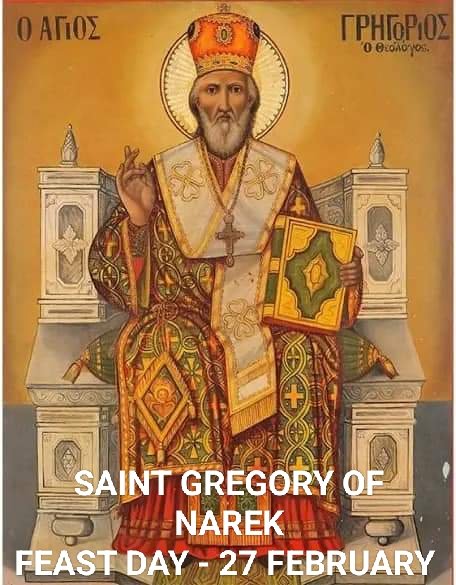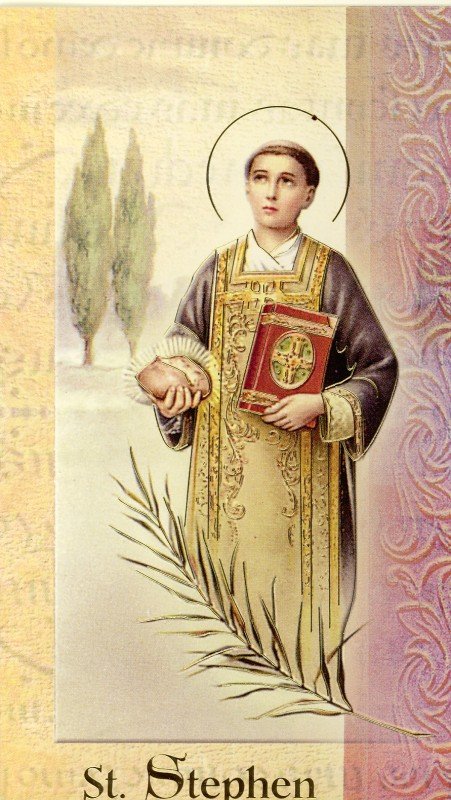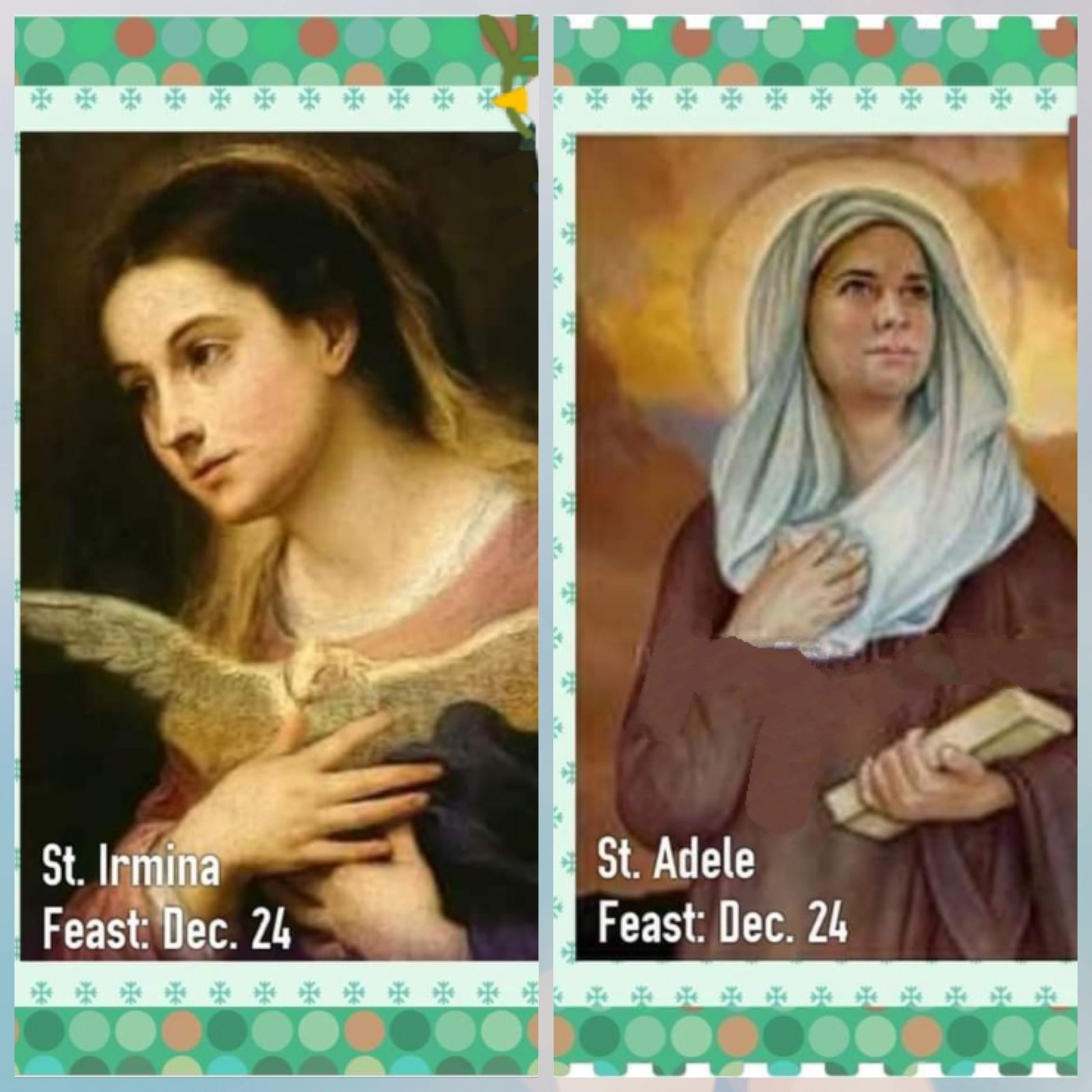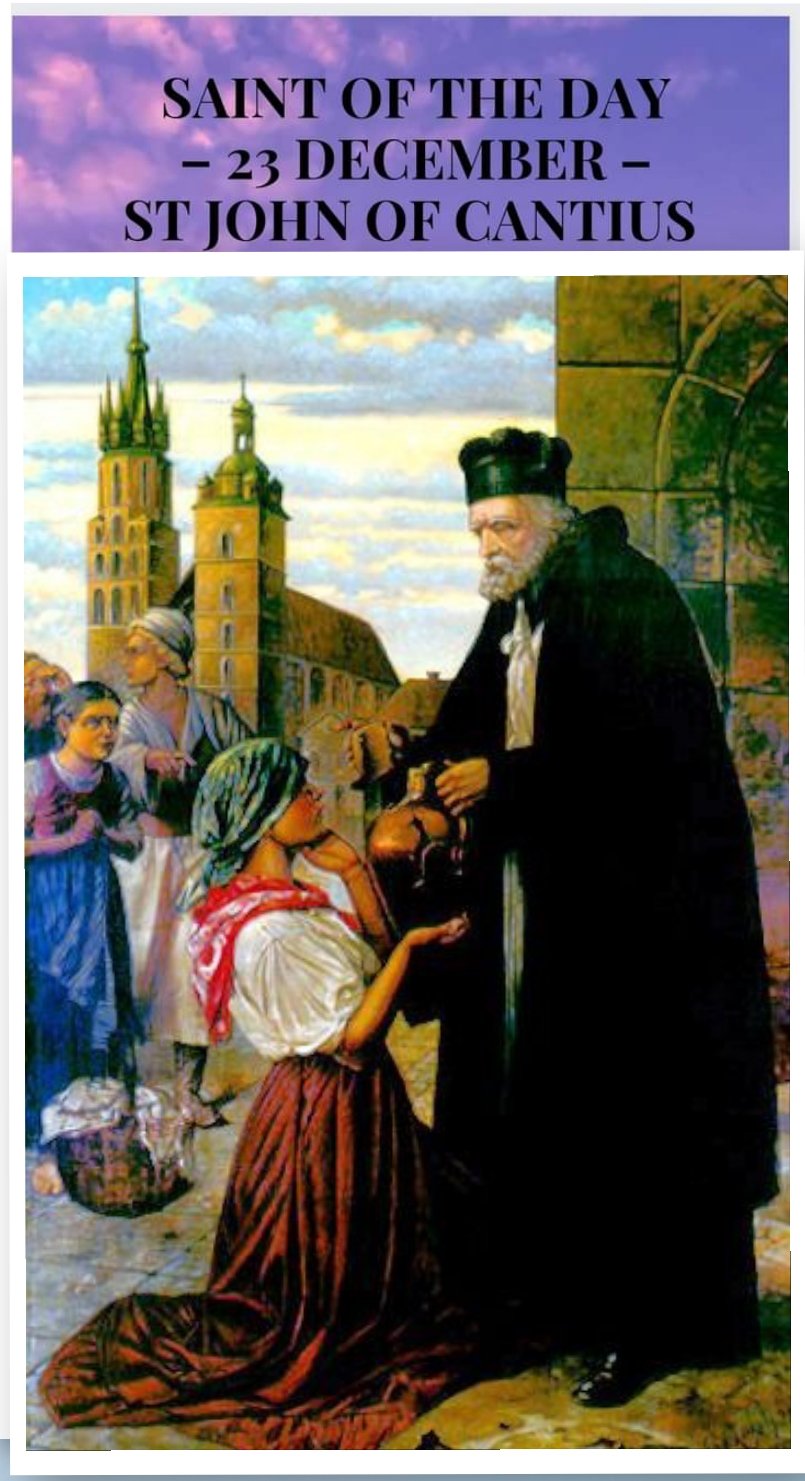
Day Eleven of Lent – Living in Exile
February 26, 2024
FEAST OF SAINT GABRIEL OF OUR LADY OF SORROWS, PASSIONIST – 27th FEBRUARY
February 27, 2024FEAST OF SAINT GREGORY OF NAREK, ABBOT AND DOCTOR OF THE CHURCH
FEAST DAY – 27 FEBRUARY
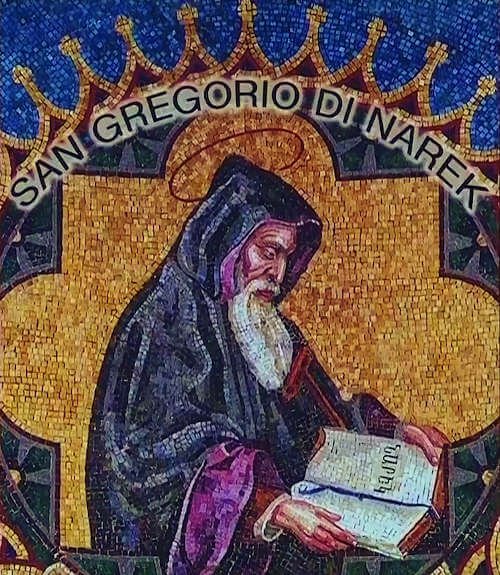
In the year 451 A.D., the Armenian Church separated from the Church of Rome over disagreements on doctrine from the Council of Chalcedon. Though the Armenian Church remained an apostolic Church, being founded by the Apostles, it became separated from the pope. Its Sacraments and life of prayer continued, but the division also continued. In recent decades, greater attempts at unification have been made, and the saint we honor today is the most recent attempt by the Roman Church to more fully unite with the Eastern Church of Armenia.
By the tenth century, the Kingdom of Armenia was celebrated for its faith, many churches, literature, art, and architecture. It was a relatively peaceful time. In the year 951 A.D., a boy named Gregory was born near Lake Van, the largest lake in the Kingdom of Armenia, modern-day Turkey. His mother died when he was young. His father was the ruling prince of the Andzevatsiq province and also an Armenian bishop and scholar.
His father was vocally supportive of some of the teachings of the Council of Chalcedon and believed that the head of the Armenian Church, called the Catholicos, enjoyed only the rank of bishop. This did not sit well with the Catholicos, who later excommunicated Gregory’s father from the Armenian Church.

After their mother’s death, Gregory and his older brother were sent to live at the Monastery of Narek, under the guardianship of their maternal great-uncle Abbot Anania, the monastery’s founder. At about the age of twenty-six, Gregory was ordained a priest for the monastery and remained there for the rest of his life, teaching theology in the monastery’s school.
The loss of his mother early in life led Gregory to a deep devotion to our Blessed Mother. He would later write, “This spiritual, heavenly mother of light cared for me as a son more than an earthly, breathing, physical mother could (Prayer 75).”
Shortly after his ordination to the priesthood, Gregory wrote a commentary on the Song of Songs. He also wrote commentary on the Book of Job, numerous chants, homilies, and speeches that sang the praises of holy men. Toward the end of his life, he wrote his most famous work, The Book of Lamentations, or, as it is commonly known today, The Book of Narek.
Gregory’s father had taught him to remain in a state of continuous dialogue with God, ever attentive to His divine presence. The Book of Narek seems to flow from Gregory’s ongoing dialogue. The book is a compilation of ninety-five prayers. Each prayer begins with the phrase, “Speaking with God from the Depths of the Heart.” The prayers then go on to express the deepest love of God by a soul that seems troubled, and even tormented at times.

The torment, however, is not despair, but an interior expression of hope from a soul who is in touch with his fallen humanity and sin, while at the same time keenly aware of God’s mercy. His prayers reflect the psalms and are similar to Saint Augustine’s Confessions. Saint Gregory states that these prayers were written “by the finger of God” (Prayer 34) and that Gregory saw God, as he says, “with my own eyes” (Prayer 27f). In one of the final prayers, Gregory states, “although I shall die in the way of all mortals, may I be deemed to live through the continued existence of this book…This book will cry out in my place, with my voice, as if it were me” (Prayer 88b; c). He believed his book was written not only for himself, his monks, or the Armenian people, but for all people, for the entire world.
Less than a century after Saint Gregory’s death, the Kingdom of Armenia was invaded by the Byzantines, then by the Turks. In the centuries that followed, these once-flourishing people suffered greatly under foreign domination. This suffering culminated in the twentieth century during the Armenian genocide when the Turks murdered an estimated 1–1.8 million Armenians. Throughout those centuries of great suffering and oppression, Saint Gregory’s book of prayers became the daily prayers of the Armenian people.
Everyone had a printed copy of Gregory’s book. Many people even slept with a copy under their pillow. In 2015, when the pope declared Saint Gregory a Doctor of the Church, and in 2021 when Saint Gregory was placed on the liturgical calendar for the Roman Church, his book of prayers suddenly became prayers for the entire world.
They are prayers that need to be prayed by all people today so that the world will humble itself before God and become acutely aware of its sin and need for God’s mercy. Let us conclude with the conclusion of Saint Gregory’s final prayer.
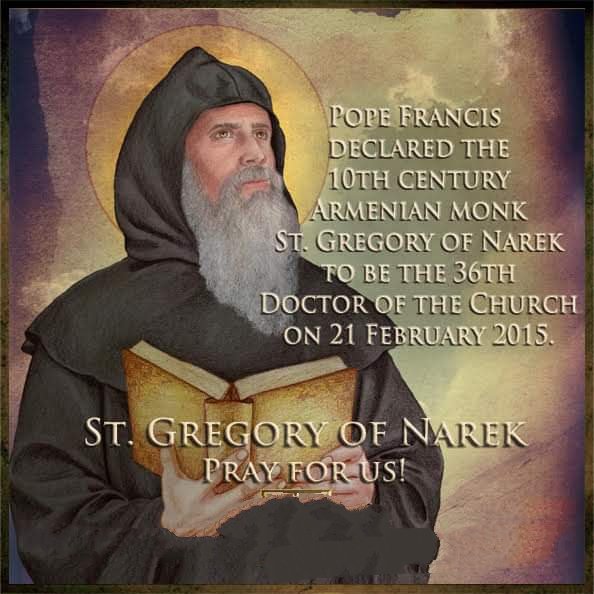
SAINT GREGORY’S PRAYER
Prepare the earth for the day of light and let the soil bloom and bring forth fruit, heavenly cup of life-giving blood, ever sacrificed, never running dry all for the salvation and life of the souls in eternal rest. And though my body die in sin, with Your grace and compassion, may I be strengthened in You, cleansed of sin through You, and renewed by You with life everlasting, and at the resurrection of the righteous be deemed worthy of Your Father’s blessing. To Him together with You, all glory, and with the Holy Spirit, praise and resounding thanks, now, always and forever, Amen
PRAYER
Almighty and eternal God, who gave your holy Church blessed Saint Gregory of Narek as Doctor (and Abbot), grant that what he taught when moved by the divine Spirit may always stay firm in our hearts; and, as by your gift we embrace him as our patron, may we also have him as our defender to entreat your mercy.
Through our Lord Jesus Christ, your Son,
who lives and reigns with you in the unity of the Holy Spirit, God, for ever and ever.Amen.

Saint Gregory, pray for us.
Source: mycatholiclife

